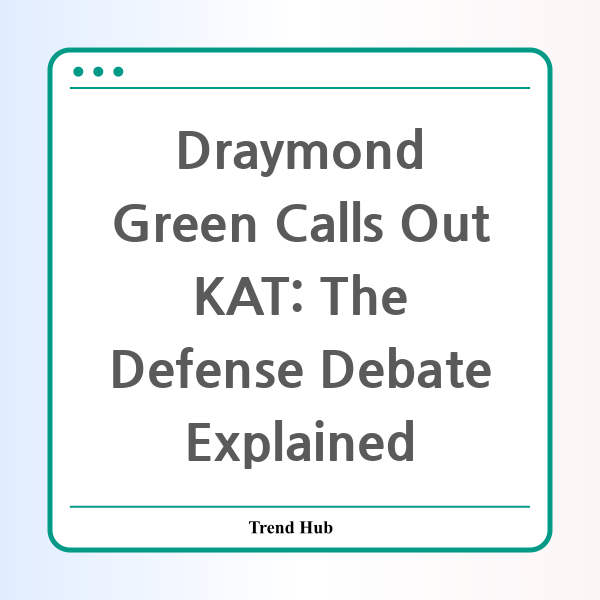* This website participates in the Amazon Affiliate Program and earns from qualifying purchases.

In the heat of the NBA season, few players command as much attention for their candid remarks as Draymond Green. Recently, his opinions have ignited a debate regarding Karl-Anthony Towns' defensive strategies, especially during high-stakes matchups against elite talents like Nikola Jokić. With the spotlight on this contentious issue, fans and analysts alike are keen to understand the various perspectives surrounding defensive efforts in professional basketball.
Draymond Green, a warrior in both name and spirit, has built a reputation for his outspoken nature when it comes to basketball. His recent commentary on KAT’s defensive effort—specifically during a game where Jokić was held to a surprising 17 points—has certainly fanned the flames of controversy. On social media, Green stated, "KAT in a full front on Joker… even if you win the game it don’t matter. You will never hold the respect from an opponent to win at the highest level… pride must make you sit down and guard, even if you give up 40…" This statement raises significant questions about the philosophy of defense in basketball.
Green’s critique hinges on the idea that defense is not just a physical battle, but a mental one. He emphasizes that winning requires not only skill but also a mental edge, suggesting that players who shy away from a one-on-one defensive confrontation, especially against a player of Jokić’s caliber, may risk losing respect within the league. The argument posits that a player must exhibit a willingness to engage fully, regardless of the outcome of a single game. In the world of sports psychology, this aligns with the notion that a player’s mindset can be as critical as their physical contributions on the court.
However, not everyone agrees with Green’s assessment. Lou Williams, a former three-time Sixth Man of the Year, defended KAT’s approach by asserting that Towns’ strategy was effective enough to lead to a victory for the Knicks. Williams argued that with a player like Jokić, who has been dominating the league, the objective shifts from pride to pragmatism. “If a guy's out there and you see him going for 30, 20, and 18 on a few nights of the week... it worked,” Williams commented, emphasizing the importance of results over individual accolades in a team sport.
Moreover, it's important to remember that defense is multifaceted. Players like Green and Towns have different styles and strengths, which can lead to varying outcomes in the same situation. Notably, KAT has struggled with defensive critiques throughout his career, but his contributions to team victories demonstrate a depth to his game that extends beyond raw statistics.
What’s intriguing about this discussion is the context in which it occurs. Towns, often scrutinized for his defensive abilities, was pitted against Jokić, who is not just a star but one of the league's best players. The dynamics of player matchups add layers to any analysis, and Green’s callout may be seen as a reflection of the competitive nature of players in the NBA.
As the debate continues, one thing is clear: the dialogue about defense in basketball will persist, as will the need for players to demonstrate resilience and adaptability in their strategies. The forthcoming games, especially the anticipated matchup between the Warriors and the Knicks, promise to be not just contests of skill but of mental fortitude and strategic prowess.
In conclusion, the discussion around KAT's defense against Jokić highlights the ongoing evolution of basketball strategy in the NBA. While personal pride and mental fortitude are paramount, the ultimate goal remains the same: securing victories and championships. The NBA community will undoubtedly keep a close eye on how players adapt to these challenges as the season progresses.
* This website participates in the Amazon Affiliate Program and earns from qualifying purchases.